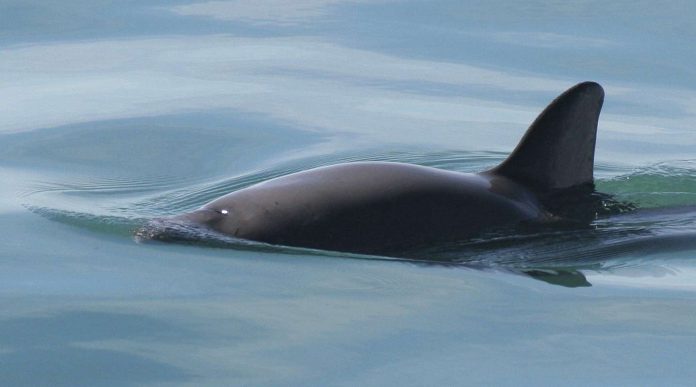
By MARK STEVENSON
MEXICO CITY (AP) — Mexico is seeking to avoid potential trade sanctions this week for failing to stop the near-extinction of the vaquita, the world’s smallest porpoise and most endangered marine mammal.
Studies estimate there may be as few as eight vaquitas remaining in the Gulf of California, the only place they exist and where they often become entangled in illegal gill nets and drown.
The government submitted a protection plan this week to the international wildlife body known as CITES, which had rejected an earlier version. It lists establishing “alternative fishing techniques” to gillnet fishing as one its top priorities.
In reality, the government’s protection efforts have been uneven.
The administration of President Andrés Manuel López has largely refused to spend money to compensate fishermen for staying out of the vaquita refuge and to stop using gill nets. The nets are set illegally to catch totoaba, a fish whose swim bladders are a delicacy in China worth thousands of dollars per pound.
The activist group Sea Shepherd, which has joined the Mexican Navy in patrols to deter the fishermen and to help destroy gill nets, says the efforts have successfully reduced the gillnet fishing.
But the Mexican government has not spent the money needed to train and compensate fishermen for using alternate fishing techniques such as nets or lines that won’t trap vaquitas.
“What is needed is fewer plans and bureaucracy, and more concrete actions in the vaquita’s habitat,” said Alex Olivera, the Mexico representative for the Center for Biological Diversity.
Olivera noted that CITES, Convention on International Trade in Endangered Species of Wild Fauna and Flora, could recommend trade sanctions if Mexico doesn’t take reasonable action.
“There is no alternative fishing gear” being offered, said Lorenzo Rojas, a marine biologist who has headed the international committee to save the vaquita. “The fisheries authorities have been notable for their absence,” leaving the effort to change practices up to civic groups and fishermen.
The Mexican government banned the use of gill nets in the area in 2017, with the understanding it would provide support payments and training on using less dangerous fishing methods.
Sea Shepherd has for years posted ships in the Gulf of California to try to discourage the illegal fishing and remove abandoned “ghost nets” that keep trapping vaquitas.
Sea Shepherd says its joint efforts with the Mexican Navy — which have sunk about 193 concrete blocks onto the bottom of the Gulf to snag illegal nets in the reserve area — has resulted in a 79% reduction in the amount of time small boats spent illegally fishing in the protected area.
It dropped from 449 hours between Oct. 10 and Dec. 5 2021, to 164 hours in the same period of 2022.
But that’s still a lot of fishing time spent in an area that’s supposed to be totally off-limits.
“We have to do better,” said Pritam Singh, the Sea Shepherd chairman.
A fisheries trade magazine, Notipesca, has reported that the Mexican government plans to fund a study examining teeth of vaquitas gathered in the past in hopes of proving they once lived in an estuary habitat fed by the Colorado River containing a mix of salt and freshwater.
Little freshwater comes down to the Mexican waters since the United States began building dams on the river the 1930s. According to one theory, the United States — not Mexico — would be responsible for the vaquitas’ decline, by cutting off the flow.
However, experts note that vaquitas found dead typically have died by drowning in nets, not from malnourishment or other causes.
In 2020, the Mexican government publicized efforts to crack down on what it called “The Cartel of the Sea,” arresting a fisherman named Sunshine Rodriguez and accusing him of being the leader of an a crime ring that trafficked in totoaba swim bladders.
But prosecutors lacked evidence, and Rodriguez — who denied trading in fish swim bladders — was acquitted of the charges against him in February after spending 2 years and 3 months locked up.
The time awaiting trial did have one effect: Rodríguez now says “I’m not going to be involved in the negotiations” between fishermen and the government, adding “Sunshine Rodríguez is standing down.”



















